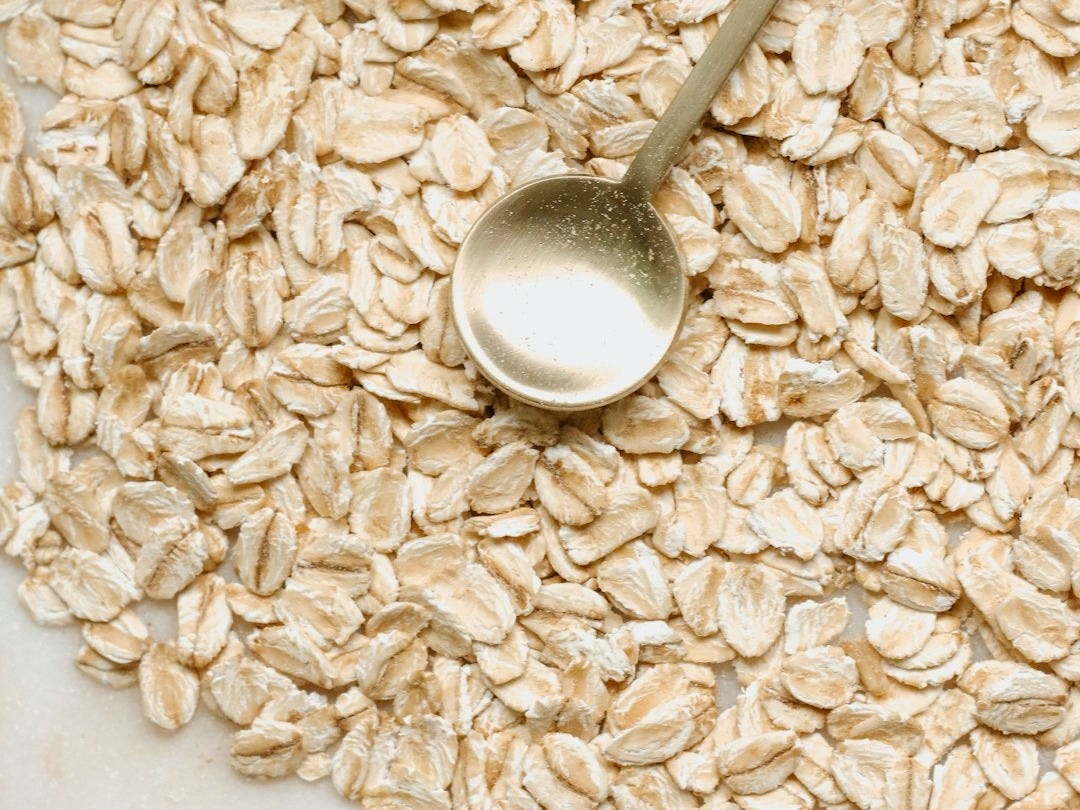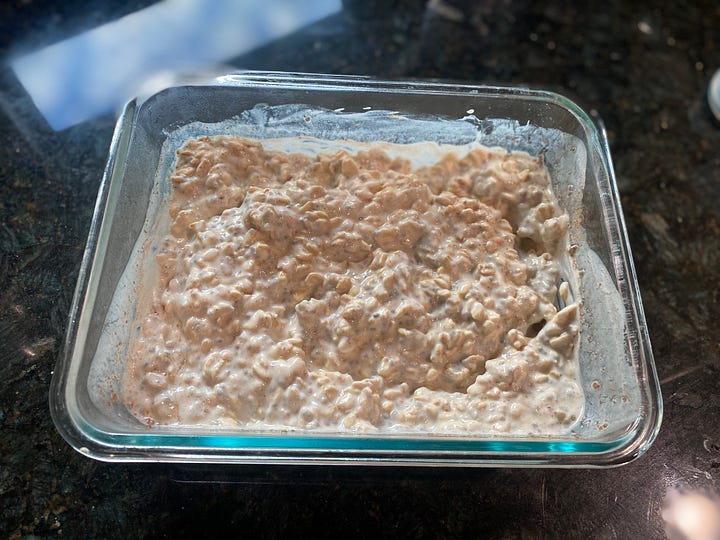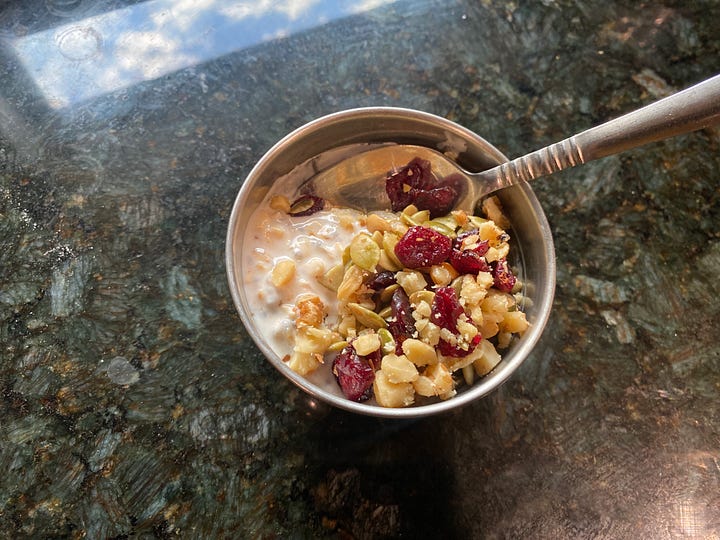Villain or Superhero? What's true about this flat grain?
This week's edition took an unexpected turn with a plot twists!
This week’s ingredient isn’t exactly new to me, but it’s been out of my routine for a long time.
About 12 years ago, I used to have Quakers cereal bar for breakfast. It was a great solution for rushed mornings. I remember well the last time I had it.
I was driving to work, unpacked the bar, took a bite, and whoa! Every taste bud was on maximum alert! I could taste every single ingredient in that thing. The taste overwhelmed me. My mouth was an explosion of sweet and artificial flavours like I had never experienced before.
I got suspicious of that sudden and strange superpower. My female intuition lit up.
The next morning I did a test to check on my suspicion. Got two bright pink lines as a result.
Yes, that out of nowhere sensitivity to a cereal bar I was used to having regularly was the indication of one thing: I was pregnant.
Oh, the flavor adventures my palate went on those next months! But never again with a Quakers cereal bar.
Back to the ingredient. I basically stopped having it after that. I don’t bake, didn’t grow up having it, so I never really missed it. But recently, a new interest has emerged.

Oats
I've had rolled oats in the pantry since December, when I experimented with making waffles. I looked at it and thought, “I want to learn more about you, dear oats.”
And boy, what a quest this has been!
Instead of jumping to Google, I went for the 3 books I read last year about food. Only one of them mentioned oats. Fiber Fueled by Will Bulsiewicz, MD, MSCI.
There, he mentions oats in two pages. His take on the grain focuses on its effects on digestion and gut microbiota. The book is centered on our microbiome, so no surprises.
He writes that oats acts like a prebiotic food that supports gut health by feeding beneficial bacteria. On page 56, we can read:
“Resistant starch, found in foods like oats, rice, potatoes, and legumes, is technically not fiber, but it behaves in a very similar way to soluble fiber. It passes through the small intestine unblemished and is fermented by our colon microbes.”
Oats are high in beta-glucan, a type of prebiotic fiber that promotes the growth of healthy microbes. This helps produce short-chain fatty acids (SCFAs) in our guts.
Short-chain fatty acids (SCFAs) play a powerful role in gut health. They’re produced when our gut microbes ferment prebiotic fibers, fueling the good bacteria that keep our digestive system thriving.
SCFAs, like butyrate, acetate, and propionate, help strengthen the gut lining, reduce inflammation, and even regulate blood sugar. But their benefits go beyond digestion. They also support metabolism, immune function, and brain health.
So, every time we feed our gut the right kind of fiber, we're not just nourishing ourselves, we’re fueling a system designed for better health from the inside out.
That’s what sparked my curiosity about oats.
But then I went on YouTube…
I was looking for a video to add here, explaining the good things oats can do for our overall health. You know, it being an ingredient that combines fat, fiber, and protein and is famous for keeping us feeling full longer, I thought I would find great videos summarizing all the benefits, but what I found instead?
Many videos from doctors not recommending oats!
Like, at all. Considering it as the worst food to start your day, an absolute no-go because of high carbohydrate (that becomes sugar) and the pesticides used in agriculture in the United States, basically calling it a poisonous food.
I was shocked and discouraged.
Then I went to the comments and became very confused.
The comments were all praising oats, sharing life experiences on how oat was always good for their long lived parents. How it is making their own life better after eating frequently for so many years, and how miraculous it has been for them. Someone mentioned being cancer-free for 20 years and credited oats.
So what now? Villain or superhero?
Well, I could not figure that out. What I noticed was doctors pro-vegetarian diets being pro oats, and doctors recommending keto and carnivore diets being extremely against.
Common sense lands us somewhere in the middle, I concluded.
I ate oats three days straight this week, and my body agrees more with the comments than the videos. It satisfied my appetite for hours, just like my whey matcha smoothie or eggs usually do.
I did, however, add walnuts and pumpkin seeds for healthy fats, trying to tune down the sugar spike in the morning.
I also found many other sources claiming the health benefits of oats. I’ll summarize it here and also provide links for you to check later.
Oats are rich in fiber, protein, and essential vitamins and minerals. They are particularly high in beta-glucan, a type of soluble fiber that helps lower cholesterol, regulate blood sugar, and support gut health by feeding beneficial bacteria. Oats also provide slow-releasing carbohydrates, keeping you full for longer and providing steady energy. Additionally, they contain antioxidants and important micronutrients like magnesium, iron, and B vitamins, which contribute to heart health, metabolism, and overall well-being.
Sources Links:
Nutrition facts
From Bob’s Red Mill Extra Thick Rolled Oats, we can read the following nutrition facts for 50g (1/2 cup) of oats:
Calories: 190
Total Fat: 3.5g
Carbohydrates: 34g
Fiber: 4g
Total Sugars: 1g
Protein: 6g
Suirprise! It’s not a smoothie this time. Instead, I found a just-as-easy use for them: Overnight Oats.
Key Ingredients for Overnight Oats
Rolled Oats: The best choice for overnight oats, as they soak up liquid without turning mushy. Skip steel-cut and quick oats for this recipe.
Milk: Use any milk, dairy or non-dairy, but unsweetened is best for more control over flavor.
Yogurt: Adds creaminess and makes the oats more filling. For a vegan option, use dairy-free yogurt.
Chia Seeds (Optional): Boost fiber, protein, and omega-3s while thickening the oats as they soak.
Flavorings: Cinnamon for warmth, maple syrup, agave or honey for sweetness, and a pinch of salt to balance everything out.
The Best Ratio for Overnight Oats
Memorize this simple ratio: Use equal parts old-fashioned rolled oats and milk, plus half as much yogurt. Very Easy & Breezy! 😉
How to Make Overnight Oats
Combine Ingredients: Mix everything in a large bowl.
Stir Well: Ensure all ingredients are evenly distributed.
Refrigerate: Cover and chill for at least 4 hours, preferably overnight. You can portion it into jars if you like.
Stir & Serve: Give it a good stir before adding your favorite toppings.
Toppings
Enjoy them as is or take them up a notch with delicious toppings like:
Fresh fruit (berries, banana slices, apple chunks)
Dried fruit (raisins, cranberries, chopped dates)
Nuts & seeds (almonds, walnuts, pumpkin seeds)
Nut butter (peanut, almond, or cashew)
Granola for a satisfying crunch
For the best texture, save crunchy toppings like nuts, seeds, and toasted coconut for the morning. Otherwise, they’ll soften too much during the soak. The same goes for delicate berries, which can turn mushy overnight.
Other things to have in mind:
Quantity: No matter how healthy oats are, carbohydrates still convert to sugar in the body. I’m no doctor, but I personally wouldn’t have more than half a cup in the morning.
Toppings: To keep blood sugar balanced, pair oats with fiber, protein, and healthy fats. Walnuts, almonds, coconut flakes, and blueberries are great choices.
Pair with protein: Overnight oats can be a satisfying side dish rather than the main event. Try pairing them with eggs for a more balanced breakfast.
How I Did My Overnight Oats
1 cup rolled oats
1 cup almond milk (or any other milk)
1/2 cup yogurt (this is my favorite one)
1 tablespoon chia
1 tablespoon agave
1/4 teaspoon cinnamon
Pinch of salt


It stayed fresh for three days, keeping the same consistency from day one. Having breakfast ready to go was very convenient. A bit more chia would’ve been nice, but the toppings gave it just the right crunch.
With all the back-and-forth, some praising oats, others condemning them, my biggest concern is still pesticides, even in organic crops. I’ll keep researching, listening to doctors I can trust, and testing my body to see how it likes oats. So far, the experience has been really good.
Listen to Your Intuition
Throughout today’s publication, we talked about instincts and gut feelings. I want to end on that same note.
This week, let’s practice pausing before automatically saying yes or no. Before following the crowd. Before brushing off that feeling (no matter how small) that something isn’t quite right.
Our intuition speaks to us in subtle ways, nudging us when something needs our attention.
Maybe there’s a situation that’s been bothering you, even just a little. Maybe someone’s words or actions don’t sit right. Instead of pushing past it, take a moment to stop and listen.
And since we’re talking about oats and their effects on our gut microbiome, here’s something interesting to consider: Science tells us that our gut health and our intuition are deeply connected. That “gut feeling” isn’t just a figure of speech; it’s a real, biological link between our digestive system and our instincts.
So this week, let’s nourish both. Feed your gut the good stuff, and trust what it’s telling you.
That’s all for today!
Until next time,









